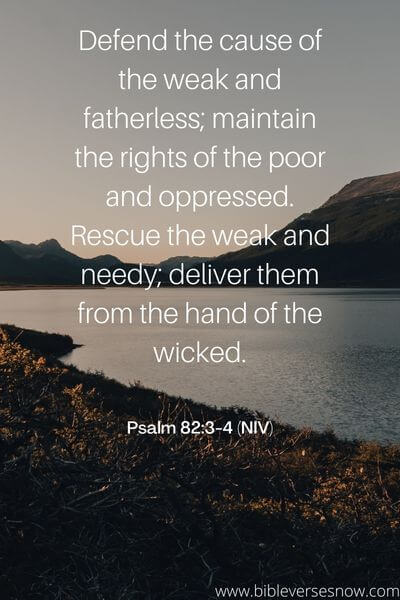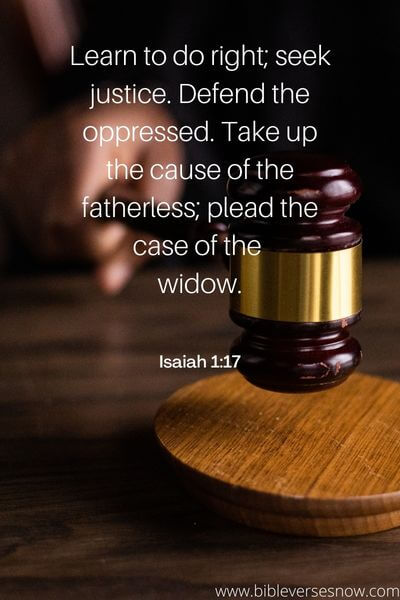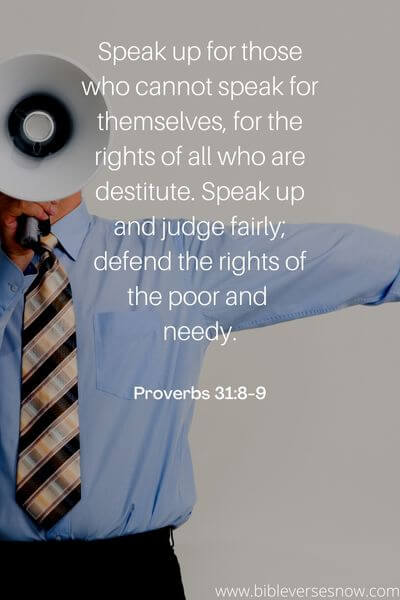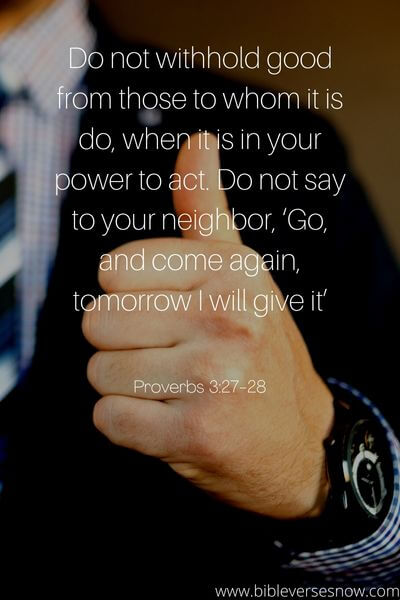“Voice for the voiceless” is a phrase that is often used to describe a person or organization that advocates for those who are marginalized or oppressed and do not have a platform to speak for themselves.
This can take the form of activism, journalism, legal representation, or other forms of advocacy, and is aimed at promoting equality, justice, and dignity for all people.
Voice for the voiceless bible verse emphasizes the importance of speaking up for the vulnerable and advocating for those who cannot speak for themselves and is often used in the context of social and political activism.
Contents
Voice for the Voiceless Bible Verse
The Bible is a powerful and frequently cited source of inspiration for many people, and it often encourages us to speak up for the voiceless.
It refers to the idea of giving a voice to people who are silenced or disregarded in society and amplifying their perspectives and experiences.
The Bible also offers many examples of people advocating for the voiceless. In the Old Testament, Moses pleaded with Pharaoh to let the Israelites go free, and Esther used her influence to save her people from extermination.
In the New Testament, Jesus healed the sick, fed the hungry, and comforted the downtrodden.
He taught us to love our neighbors as ourselves and to treat those who are different with respect and kindness.
These examples show us that God calls us to speak up for the voiceless and to fight for justice.
We are to be an advocate for those who cannot speak for themselves and to use our influence to help elevate those in need. In doing so, we honor God and bring glory to His name.
Psalm 82:3-4
Defend the cause of the weak and fatherless; maintain the rights of the poor and oppressed. Rescue the weak and needy; deliver them from the hand of the wicked.-

As believers, we are called to speak up and defend those who cannot speak for themselves, including the weak, fatherless, poor, and oppressed.
This includes advocating for their rights and protecting them from harm, and serving as a voice for those who are unable to speak for themselves.
It highlights the importance of standing up for justice and doing what is right, even if it is not easy or popular.
Romans 12:9-10
Let love be genuine. Abhor what is evil; hold fast to what is good. Love one another with brotherly affection. Outdo one another in showing honor.-

This verse encourages individuals to put the needs and interests of others before their own.
The command to “outdo one another in showing honor” suggests that there should be a strong drive to extend kindness and respect to those who are often ignored or mistreated, as well as to work towards creating a society where everyone is treated with dignity.
Isaiah 1:17
Learn to do right; seek justice. Defend the oppressed. Take up the cause of the fatherless; plead the case of the widow.-

Isaiah 1:17 is a call to action for individuals to stand up for justice and defend those who are oppressed or vulnerable.
This can involve advocating for the rights of the poor, the marginalized, and those who are marginalized in society.
The overall message is that individuals have a responsibility to promote justice and to use their voices to give a voice to those who cannot speak for themselves.
The concept of the “voice of the voiceless” emphasizes the importance of giving a voice to those who have been silenced or ignored and advocating for their rights and well-being.
It is a call to action for individuals to speak up on behalf of those who are unable to speak for themselves, and to work towards creating a more just and equitable society.
The “voice of the voiceless” serves as a reminder that everyone has a right to be heard and that it is our responsibility to ensure that the voices of the vulnerable are heard and valued.
Who are Voiceless in our Society
There are many groups of people in society who can be considered “voiceless” because they lack the power, resources, or platform to speak up for themselves and have their needs and concerns heard. Some of these groups include:
The homeless and the poor: These individuals often face discrimination and struggle to access basic necessities such as food, shelter, and healthcare.
Children: Children often have limited agency and may not have the ability to speak up for themselves or make decisions about their lives.
Women: Women face gender-based violence and discrimination and are often not included in decision-making processes.
People with disabilities: This group may face physical, social, and economic barriers to accessing education, employment, and healthcare.
Animals: Animals are often subjected to inhumane treatment, including abuse, neglect, and exploitation, and lack the ability to advocate for their own welfare.
These are just a few examples of the many groups of people who can be considered voiceless in society.
It is important to remember that everyone has the right to be heard and to have their needs and concerns addressed.
By speaking up for the voiceless, we can work towards creating a more just and equitable society for all.
Speak up for those who Cannot Speak for themselves Meaning
The phrase “speak up for those who cannot speak for themselves” refers to advocating or defending the rights and interests of individuals or groups who are unable to do so themselves due to various reasons, such as lack of resources, power, or representation.
This often involves taking action to raise awareness, protect their rights, or ensure that their voices are heard.
The Bible verse that is often associated with the phrase “speak up for those who cannot speak for themselves” are
Proverbs 31:8-9
Speak up for those who cannot speak for themselves, for the rights of all who are destitute. Speak up and judge fairly; defend the rights of the poor and needy.-

Regardless of their social or economic status. The verse encourages those who are able to speak up to do so on behalf of those who are unable to do so themselves and to use their voice to bring attention to the needs of the poor and the needy.
It is also a reminder of the responsibility that those with privilege and power have to advocate for the less fortunate and to use their resources to help bring about justice and fairness for all people.
Proverbs 3:27-28
Do not withhold good from those to whom it is do, when it is in your power to act. Do not say to your neighbor, ‘Go, and come again, tomorrow I will give it’ – when you have it with you.-

This passage is generally understood to be advising against hoarding resources and encouraging generosity towards others.
It calls for individuals to be mindful of the needs of those around them and to use their resources to help others whenever they are able.
The message is one of fairness and kindness, reminding people to be mindful of the impact their actions have on those around them.
By being generous and acting in good faith, individuals can foster positive relationships with their neighbors and contribute to a sense of community.
Speak up for the Oppressed
Speaking up for the oppressed is an important issue and it refers to advocating and supporting those who are subjected to injustice, discrimination, and mistreatment.
This can be done by raising awareness, educating others, and taking action through peaceful means such as activism, volunteering, and supporting organizations that work toward promoting equality and human rights.
As a Christian, speaking up for the oppressed involves upholding the teachings and values of Christianity, such as love, compassion, and justice.
This can include advocating for and supporting individuals or groups who are subjected to unjust treatment or discrimination.
Christians can do this by using their voice to raise awareness about social issues, volunteering their time and resources to support marginalized communities, and working towards creating a more just and equal society.
Additionally, Christians can also seek to embody these values in their personal lives through acts of kindness, generosity, and humility.
Be a Voice for the Voiceless Scripture
There are many scriptures around the world that are the voices of those who cannot speak for themselves.
These scriptures provide comfort, guidance, and strength to those in need. To be a voice for the voiceless is to use these scriptures to bring light and hope to those in darkness and despair.
The power of these scriptures goes beyond words, as they can bring peace and understanding to those who are struggling.
We can use them to give voice to those who have been wronged, to speak out against injustice and oppression, and to offer words of comfort and support to those who are suffering.
By standing up for the voiceless, we can make a difference and create a better world for everyone.
Psalm 35:22
You have seen, O Lord; do not be silent.-

This verse highlights the idea of God as a savior and protector of the vulnerable and oppressed.
It speaks to the idea that God has a special concern for those who are marginalized and in need, and that He will come to their aid in times of trouble.
this verse can serve as a reminder of the importance of advocating for and supporting those who are unable to speak for themselves.
Just as God is described as a savior and protector of the vulnerable, individuals can strive to embody this same spirit of compassion and advocacy in their own lives.
Voicing one’s opinion can often be difficult, especially when one is a member of a minority group or one’s opinions are seen as unpopular or controversial.
However, there are several ways to be a voice for the voiceless and ensure their voices are heard.
First, we should make use of social media to spread awareness of their plight and make sure their stories are heard.
There are also numerous organizations that are dedicated to raising awareness and advocating for the rights of underrepresented groups.
Becoming involved in these organizations is another way to help ensure that the voiceless are not forgotten.
Second, it is important to be vocal in our support of those who are struggling to find their voice. We can share their stories, amplify their messages, and engage in meaningful conversations with them.
It is also important to stand in solidarity with those who are speaking out, as it can be a source of strength and encouragement.








